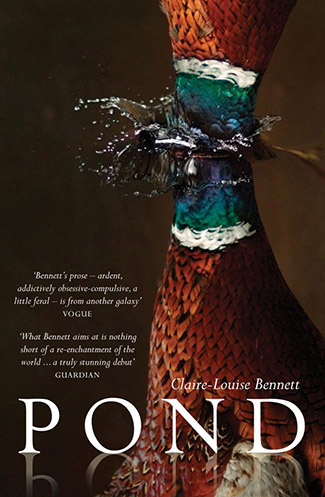

“How will I ever make myself at home here if there are always these meddlesome scaremongering signs everywhere I go.” The narrator resents the sign because it intrudes upon the “enriching joy of moving about in deep and direct accordance with things.” The overlay of a literal designation makes the terrain inaccessible. Presumably it is intended to keep children from toppling in. In “The Big Day,” the narrator comments on her friend’s sign-“Pond”-posted next to a pond. It also points to the author’s intention and design. The title of the book is a nod to Thoreau’s Walden Pond.

And the skaters and midges and the boatmen and the dragonflies and the snails and the spawn, and who knows what else the susurrant reeds are raided with. And the sly-bones heron in a world of his own. And the swans’ flotilla nests resplendent with marbled eggs. And the adrenalized coots spun out by the whirlpool of their own incessant rubbernecking and the hotheaded moorhens zigzagging to and fro. And I liked to think about the bigger fish, pike for example, that had occasionally swished past deep down and set them off nervously swaying, for miles and miles and miles perhaps. I liked to think about all the little fishes that had nudged around and prodded at the reeds here and there. She guesses that the reeds came from somewhere not too far away, along the River Shannon, most likely.

In “The Gloves Are Off,” the roofs of nearby houses are being redone with reeds, and the reeds, the narrator tells us, are great big beautiful round bundles.

Associative thinking, reverie, self-reflection, and keen awareness provide pinpricks of tension. Pond’s unnamed narrator lives her mostly solitary life on the outskirts of a small Irish coastal village near the River Shannon. What, then, is left? What is this new space in the form? The twenty pieces-the shortest is a couple paragraphs-eschew plot, lengthy dialogue, and the traditional shape of story. It has been heralded by UK critics as “sidestepping the usual conventions of narrative” and finding a “whole new space in the form.” Pond eludes classification. Pond, the debut collection by Irish writer Claire-Louise Bennett, was first published in Ireland by Stinging Fly Press and picked up by Riverhead Books in the US. Most of us don’t particularly want a lot of plot-sickness, divorce, loss, death-in our lives. Plot-the external forces that exert themselves on a life, causing it to twist and turn-happens at a dizzying if not exhausting pace.


 0 kommentar(er)
0 kommentar(er)
